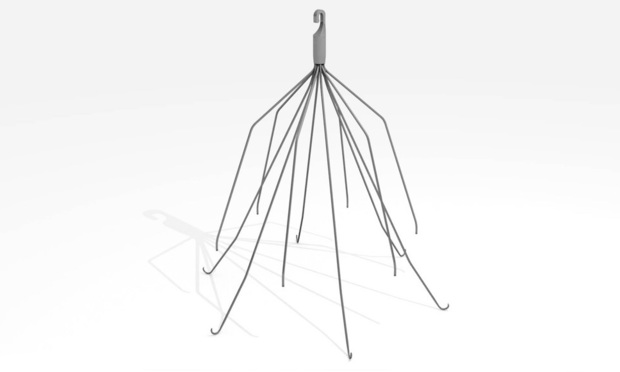Indiana Jury Awards $3M in Bellwether Trial of Cook IVC Filters
The verdict followed a month-long trial and is the first time the Cook IVC has been found defective in one of thousands of cases consolidated in multidistrict litigation in Indiana district court.
February 07, 2019 at 04:04 PM
5 minute read
 IVC blood filter
IVC blood filter
An Indianapolis jury awarded $3 million in the third bellwether case of allegedly defective intravenous blood filters manufactured by Cook Medical Inc.—one of two primary makers of the devices involved in multidistrict litigation.
The jury declined to award punitive damages following the monthlong trial.
It's the first time the Cook IVC has been found to be defective in the MDL. A jury found for the defense in 2017, and the second was dismissed on summary judgment last year after the court deemed it time-barred.
But a Texas state court jury awarded $1.2 million against the company in a failure to warn case last year.
More than 10,000 cases involving IVC complaints have been filed nationwide in state and federal courts, the vast majority naming Cook and a second manufacturer, Bard Medical, as defendants.
Cook's general counsel said the verdict will be appealed.
“We appreciate the jury's thoughtful approach and rejection of punitive damages as well as unreasonably high demands for compensatory damages,” said Cynthia Kretz, vice president and general counsel for Cook Medical.
“While we respectfully disagree with the compensatory damages and verdict, we appreciate the time and hard work of the jury,” Kretz said. “We never want to see a patient with a poor outcome and we're sorry that this patient experienced a very rare complication.”
Cook's trial counsel, Charles Weber and Andrea Pierson of Faegre Baker Daniels in Minneapolis, did not reply to request for comment.
The plaintiff, 53-year-old Tonya Brand of Snellville, Georgia, is represented by a team including Ben Martin of Dallas' Law Offices of Ben C. Martin; Denman Heard of Houston's Heard Law Firm; Laura Baughman of Baron & Budd's Dallas office; Joe Williams of Riley Williams & Piatt in Indianapolis; Misty Farris of Dallas' Fears Nachawati and Rob Hammers of Schneider Hammers in Atlanta.
IVC filters are implanted in the large vein carrying blood to a patient's heart from the lower body to filter out blood clots that can cause a pulmonary embolism.
Many of the complaints involve cases where the filters dislodged or broke apart, traveling through patients' bloodstreams into the heart or lungs.
Brand's complaint was filed in Georgia's Northern District before being combined with multidistrict litigation in Indiana's Southern District before Judge Richard Young.
In her case, a Cook IVC inserted prior to spinal fusion in 2009 fragmented, and in 2011 a portion broke through the the vein and skin of her thigh. Another piece was found to have lodged near her spine, where it remains.
“Permanent IVC filters have been used successfully since the 1950s to prevent coagulation in high-risk patients,” Hammers said. “The idea of temporary filters, a retrievable filter, created a market opportunity to have them put in until the risk subsided.”
“The problem with these filters is that they can create a cascading effect of complications: they would tilt, perforate the vein, and fracture,” he said.
In an interview, Brand's lawyers said the evidence indicated that Cook knew there were problems with device before it went on the market.
“From the very beginning, the company knew they had design problems that could cause injury to the patients, and they didn't do anything to address those concerns,” Baughman said.
Brand's complaint also included claims for failure to warn, but Young dismissed them on summary judgment.
Jurors heard from 10 experts during the trial, including key testimony from cardiovascular specialist Harlan Krumholz of the Yale School of Medicine.
“He testified that there were multiple warning signs about the use of these filters,” Baughman said, and that there were severe risks and very little benefit.
The jury deliberated for more than 11 hours Thursday, coming in after midnight with a verdict for $3 million. They came back Tuesday for about five hours of trial on punitives before deciding none were warranted.
Because the judge had ruled that only the design defect claims could proceed, much of the evidence concerning Cook's efforts to market the devices to doctors could not be presented to the jury for the punitive damages stage, Williams said.
“We had other evidence that their marketing decisions showed a complete indifference to the well-being of the patients,” he said.
“When you're asking for punitives, you've got to prove by clear and convincing evidence that there was reckless indifference on the part of defendant,” he said.
“I don't think the jury felt we met that burden,” he added.
Hammers hailed the decision a “landmark” verdict “because it is the first verdict finding the design of a retrievable filter is defective, and this verdict is also the highest compensatory award of any case tried to date.”
Thousands of cases involving Bard have been consolidated into an MDL in Arizona before Judge David Campbell. A jury there awarded $3.6 million last year to a woman who required open-heart surgery to remove fragments of an IVC that fractured in 2014.
This content has been archived. It is available through our partners, LexisNexis® and Bloomberg Law.
To view this content, please continue to their sites.
Not a Lexis Subscriber?
Subscribe Now
Not a Bloomberg Law Subscriber?
Subscribe Now
NOT FOR REPRINT
© 2025 ALM Global, LLC, All Rights Reserved. Request academic re-use from www.copyright.com. All other uses, submit a request to [email protected]. For more information visit Asset & Logo Licensing.
You Might Like
View All

'Better of the Split': District Judge Weighs Circuit Divide in Considering Who Pays Decades-Old Medical Bill

RFK Jr. Will Keep Affiliations With Morgan & Morgan, Other Law Firms If Confirmed to DHHS
3 minute readTrending Stories
- 1Exits Leave American Airlines, SiriusXM, Spotify Searching for New Legal Chiefs
- 2Etsy App Infringes on Storage, Retrieval Patents, New Suit Claims
- 3The Secret Prior Art Problem Rears Its Ugly Head
- 4Four Things to Know About Florida’s New Law to Protect Minors Online
- 5US Supreme Court Considers Further Narrowing of Federal Fraud Statutes
Who Got The Work
J. Brugh Lower of Gibbons has entered an appearance for industrial equipment supplier Devco Corporation in a pending trademark infringement lawsuit. The suit, accusing the defendant of selling knock-off Graco products, was filed Dec. 18 in New Jersey District Court by Rivkin Radler on behalf of Graco Inc. and Graco Minnesota. The case, assigned to U.S. District Judge Zahid N. Quraishi, is 3:24-cv-11294, Graco Inc. et al v. Devco Corporation.
Who Got The Work
Rebecca Maller-Stein and Kent A. Yalowitz of Arnold & Porter Kaye Scholer have entered their appearances for Hanaco Venture Capital and its executives, Lior Prosor and David Frankel, in a pending securities lawsuit. The action, filed on Dec. 24 in New York Southern District Court by Zell, Aron & Co. on behalf of Goldeneye Advisors, accuses the defendants of negligently and fraudulently managing the plaintiff's $1 million investment. The case, assigned to U.S. District Judge Vernon S. Broderick, is 1:24-cv-09918, Goldeneye Advisors, LLC v. Hanaco Venture Capital, Ltd. et al.
Who Got The Work
Attorneys from A&O Shearman has stepped in as defense counsel for Toronto-Dominion Bank and other defendants in a pending securities class action. The suit, filed Dec. 11 in New York Southern District Court by Bleichmar Fonti & Auld, accuses the defendants of concealing the bank's 'pervasive' deficiencies in regards to its compliance with the Bank Secrecy Act and the quality of its anti-money laundering controls. The case, assigned to U.S. District Judge Arun Subramanian, is 1:24-cv-09445, Gonzalez v. The Toronto-Dominion Bank et al.
Who Got The Work
Crown Castle International, a Pennsylvania company providing shared communications infrastructure, has turned to Luke D. Wolf of Gordon Rees Scully Mansukhani to fend off a pending breach-of-contract lawsuit. The court action, filed Nov. 25 in Michigan Eastern District Court by Hooper Hathaway PC on behalf of The Town Residences LLC, accuses Crown Castle of failing to transfer approximately $30,000 in utility payments from T-Mobile in breach of a roof-top lease and assignment agreement. The case, assigned to U.S. District Judge Susan K. Declercq, is 2:24-cv-13131, The Town Residences LLC v. T-Mobile US, Inc. et al.
Who Got The Work
Wilfred P. Coronato and Daniel M. Schwartz of McCarter & English have stepped in as defense counsel to Electrolux Home Products Inc. in a pending product liability lawsuit. The court action, filed Nov. 26 in New York Eastern District Court by Poulos Lopiccolo PC and Nagel Rice LLP on behalf of David Stern, alleges that the defendant's refrigerators’ drawers and shelving repeatedly break and fall apart within months after purchase. The case, assigned to U.S. District Judge Joan M. Azrack, is 2:24-cv-08204, Stern v. Electrolux Home Products, Inc.
Featured Firms
Law Offices of Gary Martin Hays & Associates, P.C.
(470) 294-1674
Law Offices of Mark E. Salomone
(857) 444-6468
Smith & Hassler
(713) 739-1250









